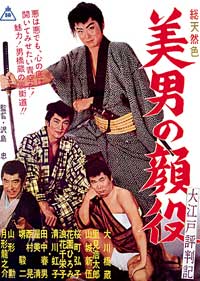[WARNING: SPOILERS!]
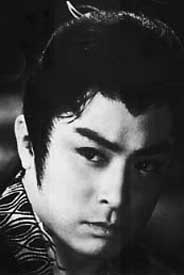 The Handsome Boss or The Handsome Leader (Oedo hyoban-ki: Binan no Kaoyaku, Toei, 1962) is better than average for a "singing samurai" epic, by right of being well-plotted. The Handsome Boss or The Handsome Leader (Oedo hyoban-ki: Binan no Kaoyaku, Toei, 1962) is better than average for a "singing samurai" epic, by right of being well-plotted.
This was for years a hard film to get to see. I saw it by the title Handsome Boss in a rarely shown 35 mm print. But recently the samurai film specialist Kurotokagi Gumi issued a "broadcast quality" copy (off Hawaiian television) on dvd with English subtitles, with a new title, Good Rascals.
Aimed at the teenage market of the early 'sixties, it is set in Tokugawa Period Edo (today Tokyo).
The character array includes a country-boy turned edokko who bursts into childish whining tears whenever he doesn't get his way (Kotaro Satomi); a plump & funny unemployed cook & stablehand (played by the well-famed actor of the Tora-san comedy series, Kiyoshi Atomi); a priest con-artist (Isao Yamagata) who doesn't seem to know much about Buddhism but can fire a pistol nicely; & a large cast of beggars & baffoon-villains. Everyone seems to be part of the comedy relief, & blessed little relief from the comedy.
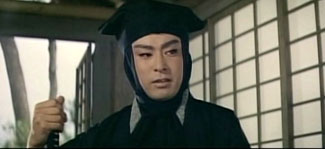 The devil-may-care hero -- the well groomed & gorgeous young ronin played by Hashizo Okawa -- is himself a bit of a con-man & a womanizer, but good-hearted to extreme. The devil-may-care hero -- the well groomed & gorgeous young ronin played by Hashizo Okawa -- is himself a bit of a con-man & a womanizer, but good-hearted to extreme.
The country-boy-turned-Edoite has written his mother claiming he has been appointed to a high office in the government, then is extremely distraught to receive his mother's reply: She's coming for a visit.
The ronin, pistol-toting bonze, unemployed cook, & a horde of beggars get their hands on some stage costumes, & move into a vacant villa. They proceed to convince the visiting naive mother that her son is indeed a lord in Edo.
There's a semi-serious thread imbedded in the tale, in that the young ronin has no mother & is attracted to the country woman as a substitute. He's eager to make the son return with his mother to their rural home, & give up the wild life of Edo. The mother in turn sees a great sadness in the lighthearted ronin, who she would gladly coddle as her own son.
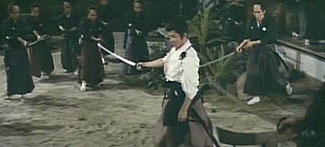 Numerous plot lines run through the story, but unlike many of these colorful teenage films, the story is not convoluted, & will leave few loose ends. Numerous plot lines run through the story, but unlike many of these colorful teenage films, the story is not convoluted, & will leave few loose ends.
The traditional sword-fight climax, in which the bad guys get theirs, is somewhat schizophrenic. Even the bad guys of the film have been comical. They purchase a western urinal, for example, thinking it's an antique vase, mooning over their good fortune. But simultaneously, they have kidnapped & held captive an innocent country girl.
The schizophrenia is partly in the fact that a film played for fun will nevertheless have a violent ending. And this can't be done with much comic feeling when for the first time in the film people will be dying.
The jokes have earlier been very good, as when the unemployed cook leaps into a river to save an old man (I forget, was that Ryunosuke Tsukigata?) from suicide, but has to be saved by the old man instead, who chastises the young cook for attempting such a foolish thing as drowning himself. But such joking around comes off badly in the climax.
For instance, our hero demands the fighting stops, & it does, while he drinks tea from a teapot's spout. Given the seriousness of the duelling choreography, it's not funny that bad guys who were mostly clowns themselves are getting killed. In similar family films the hero turns his sword over & just bruises the bad guys or knocks them unconscious with the dull side of the sword, but this one wants it both ways, comedic but death-dealing.
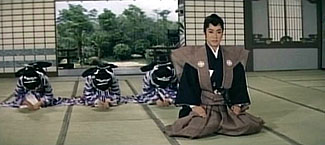 None of the good guys die of course, although the ending is left oddly ambiguous wheather or not the ronin will be exiled, beheaded, or rewarded for his various audacities against the villa's actual owner. None of the good guys die of course, although the ending is left oddly ambiguous wheather or not the ronin will be exiled, beheaded, or rewarded for his various audacities against the villa's actual owner.
The chief attribute of this sort of film is charm, & The Handsome Boss aka Good Rascals is more than commonly charming. It's not like watching a really good samurai film, which is serious stuff.
Still, sometimes it's nice to think the world might have a big population of nice people experiencing happy events. It helps balance out this world of gloom & alienation & hypoprisy such as gets revealed by serious films.
copyright © by Paghat the Ratgirl
|

